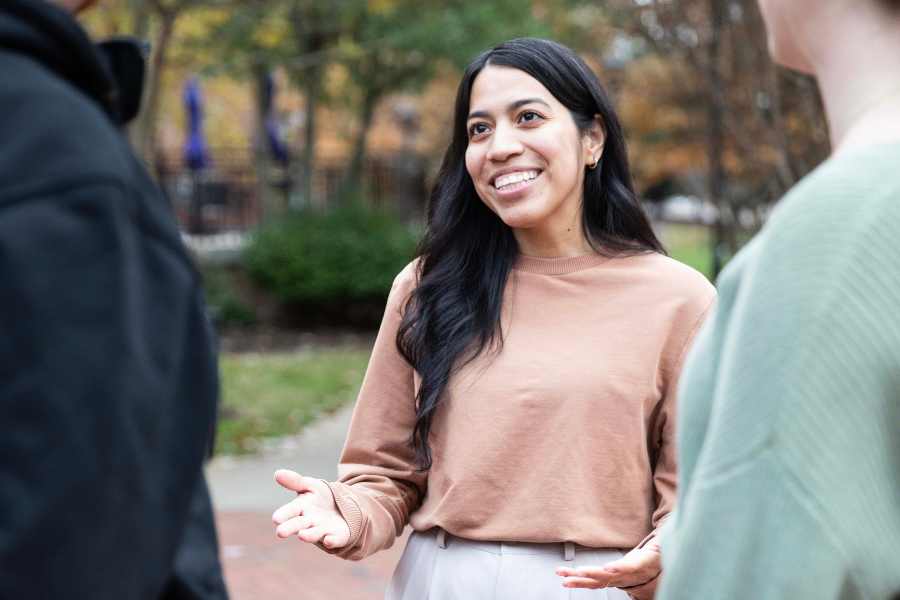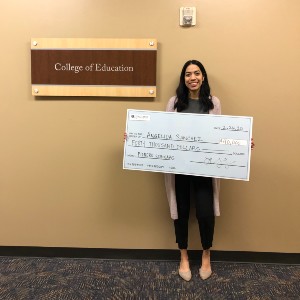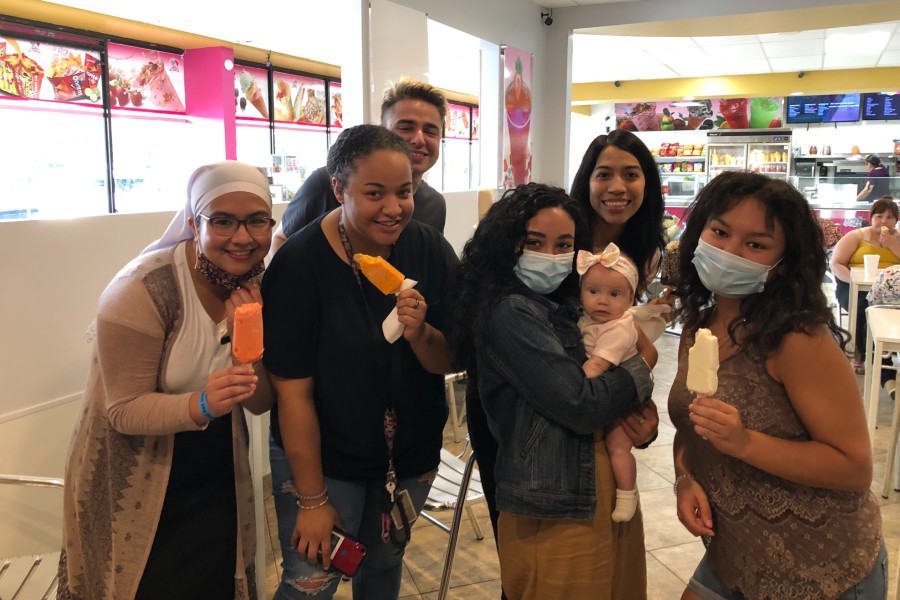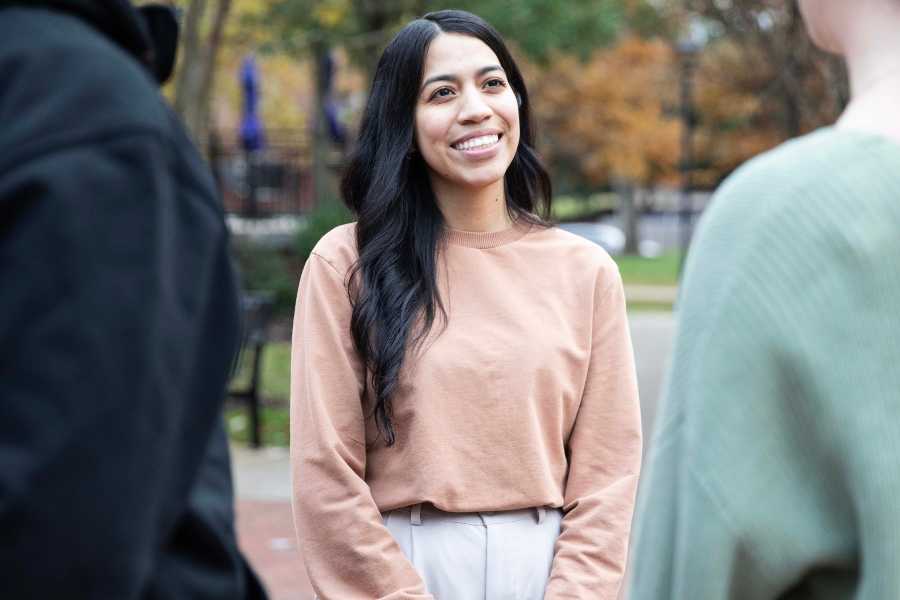Learning how to dream
First-generation alumna Angelica Barrios made her dreams a reality at Lipscomb and now she is passing on her dream to other Nashville students.
By Janel Shoun-Smith |

Sometimes students don’t even know to dream.
According to the National Center for Education Statistics, in 2022 42.5% of U.S. children under the age of 18 lived in a household where their parent or guardian did not have a college degree.
Without a family history of navigating the college admissions and financial aid processes as well as campus life, these first-generation students face greater challenges selecting, applying for and gaining admission to college.
Many simply assume that college just isn’t an option, especially a Christian education. They don’t even know to dream about it.
That’s what Angelica Sanchez Barrios (BA ’22), of Nashville, thought growing up. Knowing the financial hurdles and living in a culture that values all family members providing financial support, it just didn’t seem college could be a reality, she said.
Her first step to learning how to dream was at Nashville’s Glencliff High School, where she found out about the Tennessee Promise scholarship. The program allows Tennessee students to attend the state’s community and four-year colleges for up to five semesters by covering tuition and mandatory fees not paid by federal or other state aid.
“That made me envision going to school,” she said.
Barrios entered Nashville State Community College where she earned an associate degree in early childhood education, and also, at the age of 19, accepted the Lord. With those changes came a longing to become a classroom teacher and to earn her bachelor’s degree in a place where she “could be surrounded by people with the same beliefs.”
She was working in Nashville when a friend told her about Lipscomb’s Pionero Scholars Program, a scholarship and outreach program that seeks to increase the number of local students who become teachers and return to teach in their home communities.
In addition to providing a scholarship, the Pionero program provides dedicated faculty to provide mentorship, access to professional and career-skills development, emotional support and community building, all aspects of student life where first-generation students often lag behind.
In 2022, Barrios made her dream a reality. She walked across the stage at Allen Arena and received her bachelor’s degree in K-5 education with a certificate in English Language Learners (ELL).

Angelica Barrios received a scholarship as part of the Pionero Scholars program.
Like most of her fellow Pionero graduates, she found a job close to home, at Nashville’s Overton High School where her former seventh-grade English teacher (then -assistant principal at Overton) hired her to teach English and writing to 11th- and 12th-graders in ELL sections, where she worked for two years.
“I thrived in that classroom,” said Barrios. “Many times my students came from communities where education was not possible, so they appreciated it so much more than the average student. I loved seeing their motivation and their drive.”
At that point a new opportunity opened up for her: the chance to return to her alma mater to help Lipscomb show others local students that it is ok to not only dream of a college education, but that it can become a reality.
Barrios is now an assistant director of admissions at Lipscomb, focused on the Metropolitan Nashville Public Schools (MNPS). Her role means she can be a personal resource to students from the first time they hear about Lipscomb to the day they are ready to walk into their first class, assisting them step-by-step through the application and financial aid processes.
She spends a lot of time out in Nashville’s public schools, recruiting all types of students, but because of her personal experience, she can specifically relate to first-generation students who may not consider college an option simply because they don’t know about available support systems.
“I thrived in that classroom,” said Barrios. “Many times my students came from communities where education was not possible, so they appreciated it so much more than the average student. I loved seeing their motivation and their drive.” — Angelica Barrios
According to data collected on Lipscomb’s admissions application, 30% of the fall 2024 freshman class identified as first-generation students. According to the Center for First-generation Student Success, 54% of all undergraduates in the U.S. in 2020 had parents who did not have a bachelor’s degree.
“We promote how the college can challenge you academically, but we also promote the support programs. I tell them, if you need it, you will be supported,” said Barrios, spreading the word that for those desiring a college education, especially a Christian college education, it can happen.
“I understand them because I also had the financial struggles, but I let them know how Lipscomb worked with me and how they can get the same aid,” she said. “There are people who will support you. I experienced it firsthand. I tell them that it is not easy, but it is doable.”

Barrios and her friends in the Pionero Scholars program received dedicated faculty mentorship, access to professional and career-skills development and emotional support services.
In addition to focusing on financial methods to make Lipscomb more affordable to all, in the last few years the university has been enhancing its student services for all students, in areas of particular impact for first-generation students.
According to the National Association of Student Personnel Administrators, first-generation college students are more likely to come from low-income or minority backgrounds and to be parents, caregivers, veterans or first-generation Americans. Twenty-eight percent of first-generation students are age 30 or older.
To support those demographics, Lipscomb has made advances such as dedicated staff in the Veterans Affairs office and a portfolio review and leadership skills assessment that allows working adults to get up to 30 hours of college credit before they take the first class.
“We promote how the college can challenge you academically, but we also promote the support programs. I tell them, if you need it, you will be supported,” said Barrios, spreading the word that for those desiring a college education, especially a Christian college education, it can happen. — Angelica Barrios
An additional pipeline program, Lipscomb Lift Off, offering dedicated faculty guidance and mentorship, has been created for Nashville public school students wanting to become teachers and other grant-funded pipelines and online options for working educators have been developed.
In recognition of the growth of Lipscomb’s commuter student population, many of them coming from MNPS, Lipscomb now has a director of commuter student services, a dedicated lounge for commuter students, enhanced lighting in parking lots, is now offering some campus tours and Bible classes in Spanish and has developed pathway partnerships with community colleges (such as the one that allowed Barrios to get credit for all her Nashville State courses).
Student services such as registration, financial aid and the business office have been consolidated into the more convenient and customer-focused Bison One Stop physical and online presence.

In an effort to enhance student flourishing at Lipscomb, the university has developed a robust student success model that includes a coordinated first-year experience program for first-time freshmen, strengthening collaborative student wellness programs, dedicated academic success coaches and a Learning Commons, housing various academic support services in one organizational structure.
All these support services and enhancements are advantageous for first-generation students, who have been statistically shown to have a harder time staying in college to obtain their degree and to make a smooth path into the workforce.
Now armed with a bachelor’s and job experience working with students in various contexts, Barrios has no problem dreaming of a better future. She is thinking she may now go for a master’s degree in counseling. It’s an area she feels called to by God.